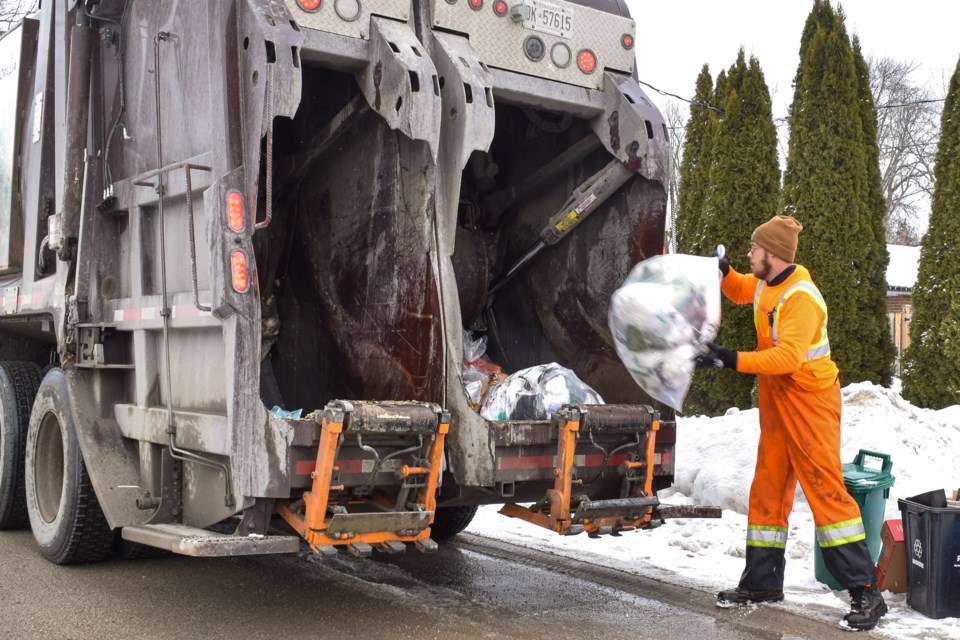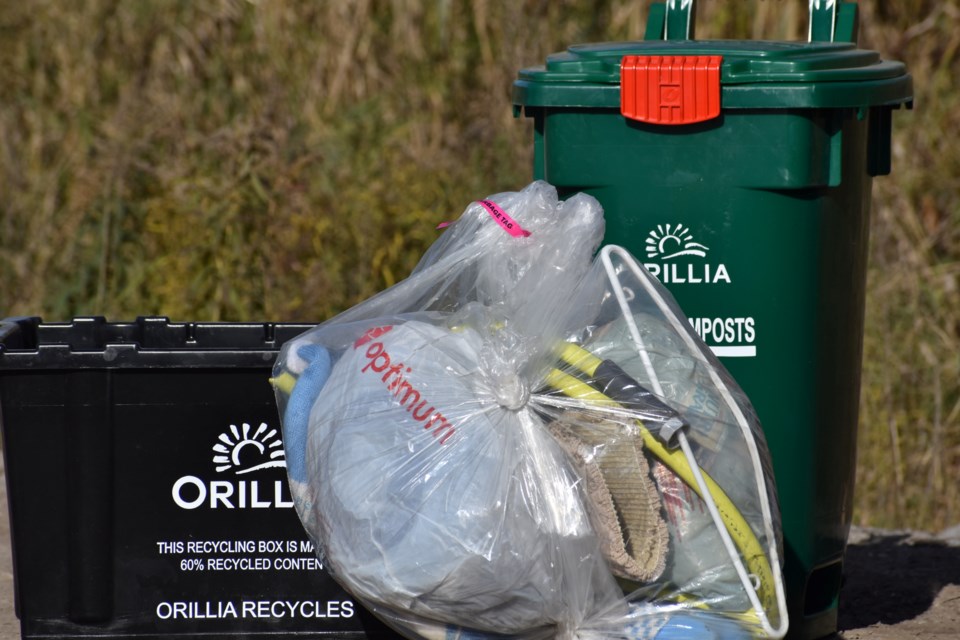As some Greater Sudbury city council members line up to echo residents’ opposition to a clear garbage bag mandate, municipalities that have adopted the mandate are reporting positive results.
When it comes to mandating the use of clear garbage bags, success is defined as diverting waste from landfills, which is reportedly a common result.
Clear garbage bags allow garbage collectors to see what’s inside, with bags containing too much recyclable material or organic waste rejected at the curbside.
The City of Orillia mandated clear garbage bags in early 2022. By the end of the program’s first year, they reported a curbside garbage reduction of 38 per cent.
Their program was deemed a success right off the hop, with the first week recording a 95-per-cent compliance rate and a 47-per-cent drop in the weight of garbage collected at the curbside, alongside jumps in organics collections.
Many other municipalities to mandate the use of clear garbage bags report similar results, including 21 of 22 North American communities included in a 2008 meta-analysis (compilation of more than one study) by Stewardship Ontario and Quinte Waste Solutions.
Of the 22 communities, 21 found that clear bag requirements led to increased recycling tonnage. The only exception was Omaha, Nebraska, which introduced recycling at the same time as clear bags so were unable to attribute any changes to clear bags.
Among the nine Canadian municipalities included in the analysis, two-thirds also reported an increase in organics collection.
An analysis of 13 Nova Scotia municipalities showed a 41-per-cent drop in residential waste, 35-per-cent increase in recycling and 38-per-cent jump in organics collection after two years of their clear bag mandates.
Other factors, such as bag limits, were also at play for many of the 22 communities included in the analysis, though seven Canadian and four American respondents directly attributed increased recycling tonnage to clear garbage bags.

In Greater Sudbury, a clear garbage bag mandate was included as one of 18 recommendations in the city’s proposed Solid Waste Management Master Plan, and has received the lion’s share of city council members’ feedback.
“It’s going to be problematic to get the support,” Ward 5 Coun. Mike Parent said during last week’s operations committee meeting of city council, pointing to a public poll which showed only 50-per-cent support among respondents (an opt-in survey not statistically relevant to the general public), which was the lowest support among the plan’s 18 recommendations.
Low support related to privacy concerns have dogged clear bag mandates at many municipalities, and is the chief reason cited by Welland city council for quashing a mandate in 2019. The Niagara Falls Review reported a 50-per-cent support rate, with vocal opponents.
Privacy was the main concern among the 22 municipalities whose clear bag mandate results were compiled in 2008.
Many municipalities have opted to allow small opaque privacy bags within clear bags for private items, which the City of Greater Sudbury has indicated they would also allow, while others have noted that clear garbage bags can be placed within garbage cans and therefore outside the view of neighbours.
The punitive nature of clear garbage bag programs is also a point of concern among many municipalities, and was raised by Ward 5 Coun. Pauline Fortin last week.
In Cornwall, which is slated to take on a clear garbage bag mandate in 2025, a threshold of 10-per-cent recyclables and/or organics in clear bags has been established. Those who exceed this threshold will find their garbage is not collected. In the 2008 meta-analysis, it’s noted that most municipalities left a sticker or tag informing residents of their infractions.
Greater Sudbury has yet to establish a threshold for waste diversion, but a municipal report notes that extra leniency would be extended to residents when the program first rolls out.
The Solid Waste Management Master Plan, which establishes a 10-year plan and includes a proposed clear garbage bag mandate as option No. 3, is expected to face a city council vote within a few months.
Although this plan guides the City of Greater Sudbury in a certain direction, a subsequent decision of city council will determine whether a clear garbage bag mandate is adopted.
Meanwhile, the city is also considering a shift to automated garbage collection when the current collection contract ends in 2028. As such, if a clear garbage mandate were to be adopted, it would likely come into play before then.
Automated pickup is a cart-based collection process where carts are rolled to the curb by residents, where they are lifted by collection vehicles’ mechanical arms to have their contents tipped inside.
This allows less opportunity to inspect the content of garbage bags than the city’s current manual curbside pickup.
The city’s Community Energy and Emissions Plan, which includes an overall goal of hitting net-zero emissions by 2050, includes 90-per-cent waste diversion from the city’s landfill sites.
For additional context via a list of 40 frequently asked questions Cornwall compiled from their public consultations, click here.
Tyler Clarke covers city hall and political affairs for Sudbury.com.
